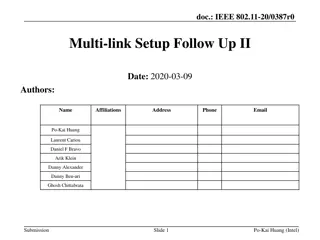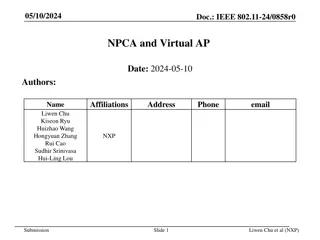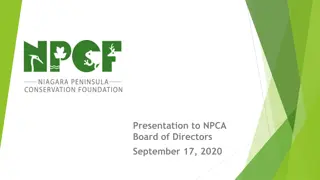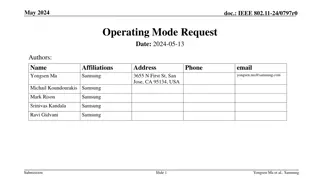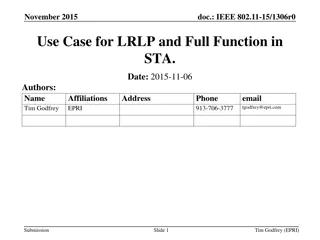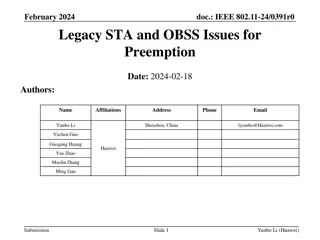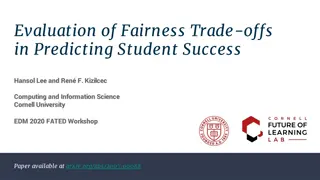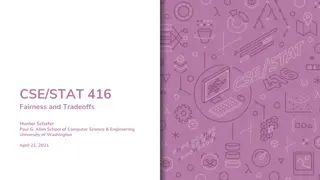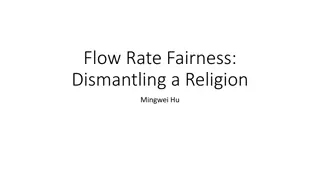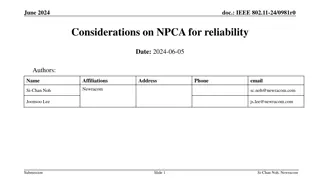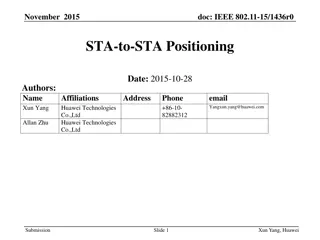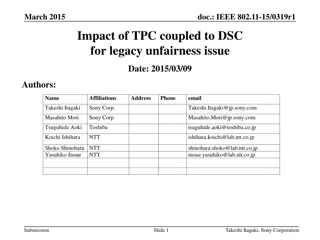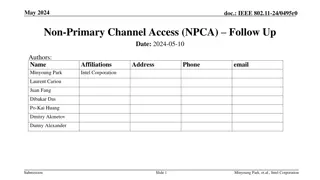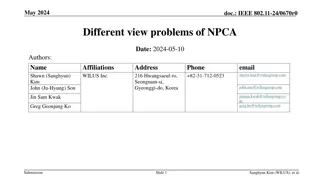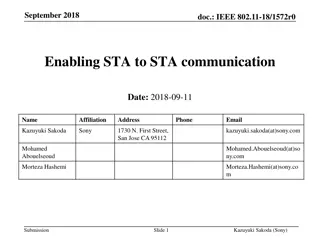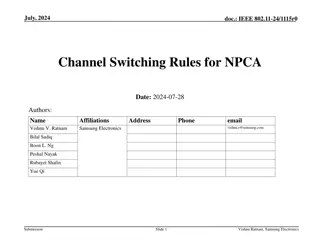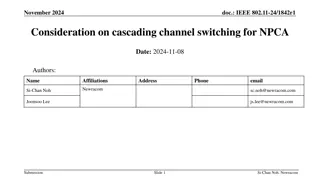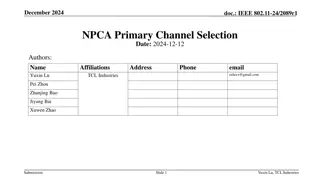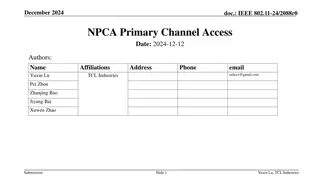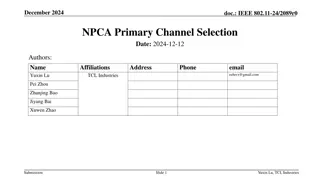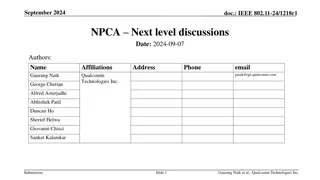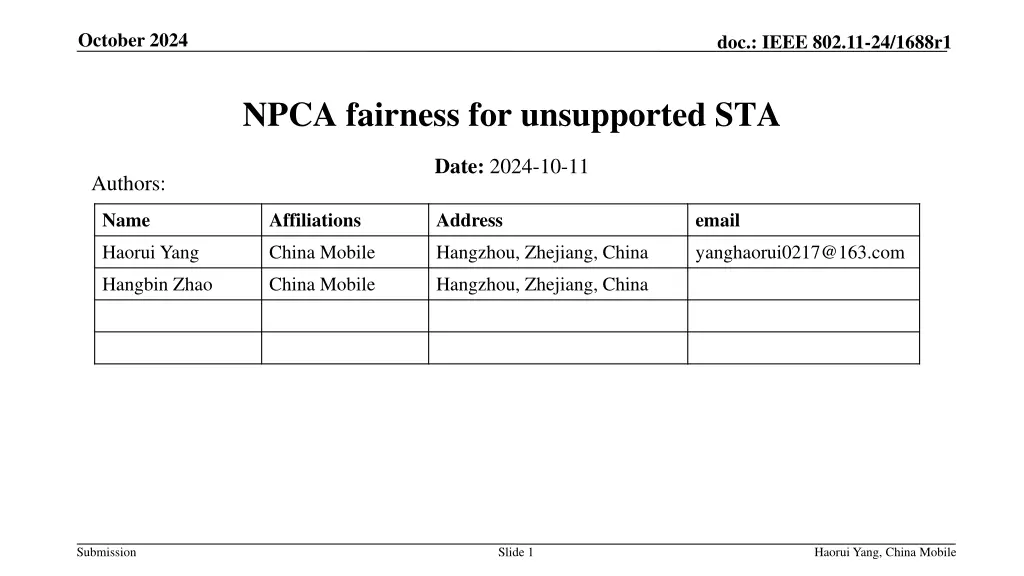
Enhancing Channel Access Fairness in IEEE 802.11 Networks
Explore the issue of fairness for unsupported STAs in IEEE 802.11 networks utilizing the NP Capable AP feature. The submission highlights scenarios where STAs supporting NP Capable APs impact the fairness of channel access for legacy STAs, proposing solutions to ensure equitable access to the transmission opportunity (TXOP) for all devices within the Basic Service Set (BSS).
Download Presentation

Please find below an Image/Link to download the presentation.
The content on the website is provided AS IS for your information and personal use only. It may not be sold, licensed, or shared on other websites without obtaining consent from the author. If you encounter any issues during the download, it is possible that the publisher has removed the file from their server.
You are allowed to download the files provided on this website for personal or commercial use, subject to the condition that they are used lawfully. All files are the property of their respective owners.
The content on the website is provided AS IS for your information and personal use only. It may not be sold, licensed, or shared on other websites without obtaining consent from the author.
E N D
Presentation Transcript
October 2024 doc.: IEEE 802.11-24/1688r1 NPCA fairness for unsupported STA Date: 2024-10-11 Authors: Name Affiliations Address email Haorui Yang China Mobile Hangzhou, Zhejiang, China yanghaorui0217@163.com Hangbin Zhao China Mobile Hangzhou, Zhejiang, China Submission Slide 1 Haorui Yang, China Mobile
October 2024 doc.: IEEE 802.11-24/1688r1 Introduction In [1], it has been agreed to specify NPCA feature in 11bn. Also a lot of contributions are proposing NPCA details from the different perspective, mainly focusing on the procedure after switching. This submission provides a scenario that needs to be considered before the STAs swtich to the NPCA primary channel. Submission Slide 2 Haorui Yang, China Mobile
October 2024 doc.: IEEE 802.11-24/1688r1 Scenario There is the possible and usual scenario as below based on the passed NPCA Motion#11 in [1]: In one BSS, there are STAs (e.g., STA 2) supporting NPCA and may receive the OBSS PPDU, while the other STAs (e.g., STA 1) do not support NPCA. STA 1 and STA 2 are contending the WM and running their own backoff timer. During the backoff, OBSS PPDU is received, then the STA 2 and the AP 1 switch to the idle NPCA primary channel, in the result, STA 1 loses its chance to obtain the TXOP. Submission Slide 3 Haorui Yang, China Mobile
October 2024 doc.: IEEE 802.11-24/1688r1 Issue during EDCA Channel access fairness issue for the STA 1: The STA 1 cannot obtain the TXOP even when it has smaller BO timer, which is not fair. If without NPCA, the STA 1 should have contended fairly to access the WM, but now it has lower chance than the STA 2. No matter using the primary channel or secondary channel, the STAs should have the fair chance to get the TXOP. TXOP should be independent from which access mechanism is used. Therefore, the NPCA procedure design should consider all the STAs in the BSS from the system performance perspective, instead of only focusing on the NPCA supported STA. otherwise, at least the performance/user experience of legacy STA will be badly impacted. Submission Slide 4 Haorui Yang, China Mobile
October 2024 doc.: IEEE 802.11-24/1688r1 Solution 1 Follow the current EDCA principle no matter which channel will be used. The STA 1 and STA 2 continue the EDCA procedure when the STA 2 receives the OBSS PPDU. This can achieve the same level of fairness as the legacy mechanism since the STA 1 can also have chance to obtain the TXOP. This can apply to the case where all the STAs support NPCA and receive the OBSS PPDU. Submission Slide 5 Haorui Yang, China Mobile
October 2024 doc.: IEEE 802.11-24/1688r1 Solution 1 If the BO timer of STA 1 expires first, the STA 1 obtains the TXOP and NPCA is not possible. Assuming the AP cannot communicate with the different STAs over both the primary channel and secondary channel simaltaneously. If the BO timer of STA 2 expires first, the STA 2 can perform the NPCA, if the basic NAV is still nonzero or above the threshold. This can somehow equate part of contend time over the NPCA primary channel for the potential NPCA STAs. Case 1 Case 2 Submission Slide 6 Haorui Yang, China Mobile
October 2024 doc.: IEEE 802.11-24/1688r0 Solution 2 Limiting the NPCA scope to the STAs utilizing the TXOP on the BSS primary channel The STAs already utilizing the TXOP receives the OBSS PPDU then switch to NPCA primary channel. Since the TXOP owner already won the competition, there is no faireness issue if they continue the transmission on the NPCA primary channel in the TXOP duration. The other STAs in the same BSS can avoid the unnecessary NPCA swtich and there is no difference in their perspective. The TXOP owner does not change after NPCA switching back. Submission Slide 7 Haorui Yang, China Mobile
October 2024 doc.: IEEE 802.11-24/1688r1 Summary The channel access fairness of all the STAs in the same BSS should be considered to not harm the legacy STAs. It is proposed that: Option 1: the STAs receving the OBSS PPDU shall continue the EDCA and obtain the TXOP before NPCA. Option 2: only the STAs participating in the current TXOP perform the NPCA. Submission Slide 8 Haorui Yang, China Mobile
October 2024 doc.: IEEE 802.11-24/1688r1 References [1]: 24/0209r7, Specification Framework for TGbn Submission Slide 9 Haorui Yang, China Mobile

